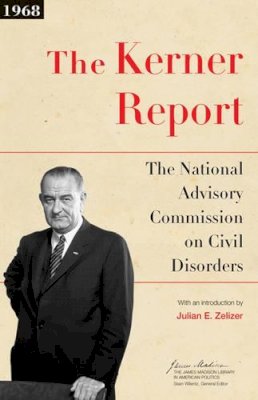
Stock image for illustration purposes only - book cover, edition or condition may vary.
The Kerner Report
National Advisory Commission On Civil Disorders
€ 129.31
FREE Delivery in Ireland
Description for The Kerner Report
Hardback. Series: The James Madison Library in American Politics. Num Pages: 544 pages. BIC Classification: 1KBB; HBTB; JPVH1. Category: (P) Professional & Vocational; (U) Tertiary Education (US: College). Dimension: 225 x 147 x 39. Weight in Grams: 736.
The Kerner Report is a powerful window into the roots of racism and inequality in the United States. Hailed by Martin Luther King Jr. as a "physician's warning of approaching death, with a prescription for life," this historic study was produced by a presidential commission established by Lyndon Johnson, chaired by former Illinois governor Otto Kerner, and provides a riveting account of the riots that shook 1960s America. The commission pointed to the polarization of American society, white racism, economic inopportunity, and other factors, arguing that only "a compassionate, massive, and sustained" effort could reverse the troubling reality of a racially divided, separate, and unequal society. Conservatives criticized the report as a justification of lawless violence while leftist radicals complained that Kerner didn't go far enough. But for most Americans, this report was an eye-opening account of what was wrong in race relations. Drawing together decades of scholarship showing the widespread and ingrained nature of racism, The Kerner Report provided an important set of arguments about what the nation needs to do to achieve racial justice, one that is familiar in today's climate. Presented here with an introduction by historian Julian Zelizer, The Kerner Report deserves renewed attention in America's continuing struggle to achieve true parity in race relations, income, employment, education, and other critical areas.
Product Details
Format
Hardback
Publication date
2016
Publisher
Princeton University Press United States
Number of pages
544
Condition
New
Series
The James Madison Library in American Politics
Number of Pages
544
Place of Publication
New Jersey, United States
ISBN
9780691174242
SKU
V9780691174242
Shipping Time
Usually ships in 15 to 20 working days
Ref
99-15
About National Advisory Commission On Civil Disorders
The National Advisory Commission on Civil Disorders was established by President Lyndon B. Johnson. Its members included former Illinois governor Otto Kerner, New York City mayor John Lyndsay, U.S. senators Edward Brooke and Fred R. Harris, and NAACP executive director Roy Harris. Julian E. Zelizer is the Malcolm Stevenson Forbes Class of 1941 Professor of History and Public Affairs at Princeton University. His many books include The Fierce Urgency of Now: Lyndon Johnson, Congress, and The Battle for the Great Society.
Reviews for The Kerner Report
"The 2016 reissue of the report, along with historian Julian Zelizer's riveting introduction, should be required reading for all Americans interested in understanding the historical and policy roots of contemporary discussions of race."
-Peniel Joseph, CNN "Some aspects of the report may resonate even more loudly today than they did in the late 1960s. For example, the commission’s repeated emphasis on the role of police brutality in alienating black citizens and sowing the seeds of urban discontent now assumes added significance, given the many images of unarmed black men whose deaths at the hands of the state have been seared into the national psyche. Indeed, some of the report’s assessments could—eerily and depressingly—have been written yesterday to describe America’s recent racial disturbances, in locales ranging from Ferguson, Missouri, to Baltimore, Maryland: 'Almost invariably the incident that ignites disorder arises from police action.'"
-Justin Driver, The Atlantic
-Peniel Joseph, CNN "Some aspects of the report may resonate even more loudly today than they did in the late 1960s. For example, the commission’s repeated emphasis on the role of police brutality in alienating black citizens and sowing the seeds of urban discontent now assumes added significance, given the many images of unarmed black men whose deaths at the hands of the state have been seared into the national psyche. Indeed, some of the report’s assessments could—eerily and depressingly—have been written yesterday to describe America’s recent racial disturbances, in locales ranging from Ferguson, Missouri, to Baltimore, Maryland: 'Almost invariably the incident that ignites disorder arises from police action.'"
-Justin Driver, The Atlantic
